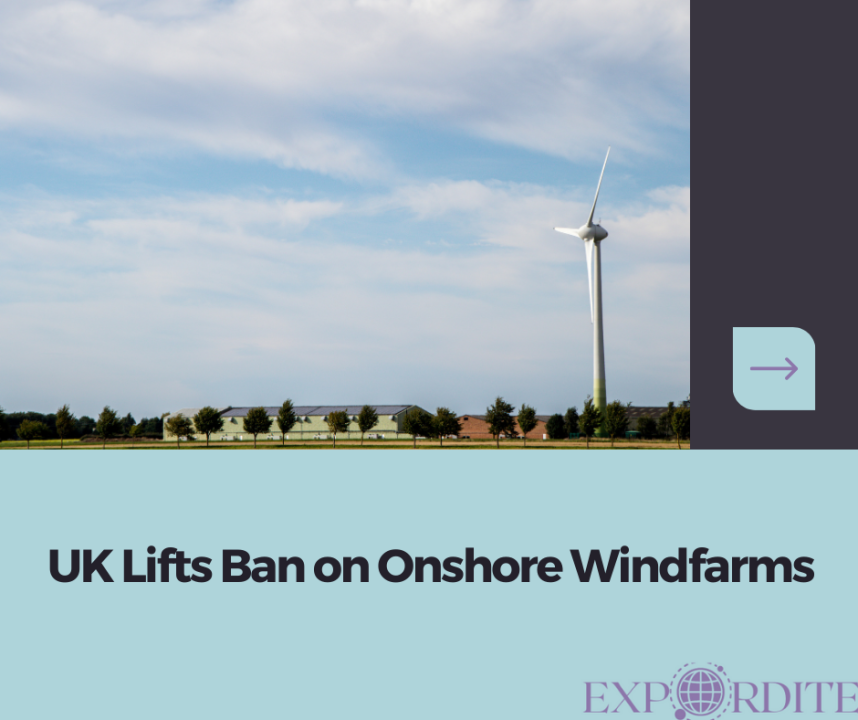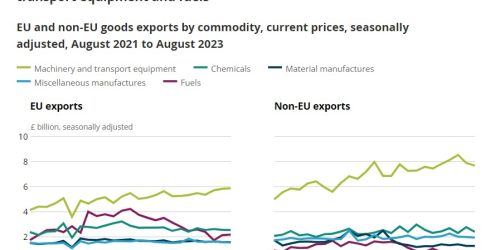10 UK Export News You Might’ve Missed – Week 28

In this edition of Export News from Expordite, we’ll cover the top 10 UK export news and headlines from week 28 of 2024 — July 8th-16th, 2024.
Key News
- TRA opens review into polyethylene terephthalate from India
- UK officials fear October port chaos unless EU again delays biometric plan
- Labour lifts Tories’ ‘absurd’ ban on onshore windfarms
General Export News
1. British Embassy celebrates record UK-Lebanon trade figures
“In 2023, bilateral trade figures between the UK and Lebanon passed the £1bn mark for the first time ever, reaching a record high of £1.1 billion, an increase on over 45% on 2022. Export brands increased to £160 million. The top five goods exported by the UK to Lebanon throughout 2023 were mechanical power generators, cars, beverages, dairy products, medicinal and pharmaceutical products. Services accounted for over £600m.
During the reception, Ambassador Cowell said:
Given the many local and regional challenges, it is great to be able to celebrate these record-breaking figures which are testament to the strength of the UK/Lebanon partnership. They demonstrate the opportunities our businesses are finding in both countries. We are very keen to see more UK brands come to Lebanon. We are also supporting Lebanese investments in the UK across various sectors.“
Source: GOV.uk
2. TRA opens review into polyethylene terephthalate from India
“The Trade Remedies Authority has today (10 July 2024) initiated a transition review of a countervailing measure on polyethylene terephthalate (PET) from India.
PET is a type of plastic that is used to produce beverage bottles, make packaging for food products, and is used in textiles like clothing fabrics. In 2023, total imports of PET were worth over £200 million.
The TRA will be reviewing this measure, which was inherited from the EU, to determine whether it is still suitable for the UK’s needs. The current duties applied to PET from India range from 0% to 13.8%.
The period of investigation for this transition review is 1 January 2023 to 31 December 2023. The injury period for the case is 1 January 2020 to 31 December 2023.“
Source: GOV.uk
3. What will the UK’s new Labour government mean for the art trade?
“The newly appointed chairman of the British Art Market Federation (BAMF), Martin Wilson, is optimistic about the impact Labour will have on the art trade.
“There have been gloomy voices claiming arts and culture are not a priority for the new government and that tax changes will upset things,” he says. “But I take the opposite view.” For a start, he says he is encouraged by the energy that comes with any new government, and he points out what the fact that the British art market is a “huge success story. Look at what the art market here creates in terms of tourism, and our position as a cultural hub. This government is, as they say, laser-focused on growth, so I think this is an opportunity to build on the existing success”.
Overall, he hopes that the amount of paperwork could be alleviated. “When you look at the US—which is by far the largest art market in the world—they have the same concerns as we do but somehow manage to alleviate these with a lighter touch.”“
Source: The Art Newspaper
4. UK officials fear October port chaos unless EU again delays biometric plan
“UK government officials fear tailbacks and chaos at UK ports in three months’ time unless the EU again delays plans to introduce a biometric travel registration scheme requiring facial and finger scanning.
From 6 October all non-EU nationals will be required to enter biometric and fingerprint technology under a new European entry/exit system.
The scheme’s introduction is seen as a critical moment when British citizens – as opposed to businesses – will suddenly feel the impact of the end of free movement on their daily lives. Part of the problem is that an app prepared by the EU and Frontex that is supposed to streamline the process of registering individual data is not yet definitely ready.“
Source: The Guardian
5. Labour lifts Tories’ ‘absurd’ ban on onshore windfarms
“The de facto ban on new onshore windfarms has been dropped by the Labour government, to the delight of environmentalists and energy experts.
The ban was caused by two footnotes to the National Planning Policy Framework (NPPF), the rules that govern the building of homes and infrastructure.
In Labour’s new draft NPPF, these footnotes have been deleted in their entirety, meaning onshore wind projects are now on an even footing with all other forms of infrastructure. The change, which comes into force immediately, will be confirmed to parliament on 18 July after the Commons resumes sitting.“
Source: The Guardian
6. Traders and government could be missing out on revenue due to use of incorrect commodity codes, says customs expert
“Customs classification – the practice of identifying and using the correct commodity code for your product – is a key requirement for any cross-border trader.
Commodity codes are used in the completion of customs declarations and to identify what measures, duties and quotas may apply to any internationally traded good.
It is therefore striking that, at a recent IOE&IT webinar, classification experts TariffTel reported its findings that around two in every five businesses are using the incorrect codes.
This means there are potentially thousands of businesses that aren’t paying the correct levies on their goods. These goods movements are also at a higher risk of being delayed if they have incorrect paperwork, and these businesses could even be liable to being fined by HMRC. “
Source: The Chartered Institute of Export & International Trade
7. New Welsh trade policy calls for more support for SMEs and to draw on Wales’ culture to promote exports
“The Welsh government has called for more support for small businesses, innovation provisions in trade agreements and a focus on using Welsh culture and language to promote investment into Wales.
Released yesterday (11 July), the policy document outlines the approach of the Labour-led administration for promoting international trade to the benefit of Wales.“
Source: The Chartered Institute of Export & International Trade
8. Secret Hotel Tape Foils Harrods Supplier’s Russian Perfume Sales
“A supplier of perfumes to Harrods is facing a criminal investigation after continuing to sell his high-value products to Russia, in a sign that luxury goods are still being sent to the country in breach of UK sanctions.
Company director, David Crisp, is accused of knowingly breaking the export bans after continuing to offer his perfumes to Russia well into 2023, according to a London civil court ruling published last week.”
Source: Bloomberg UK
9. Beef imports from Britain jump 177 percent
“WINNIPEG — Beef imports from the United Kingdom are up 177 percent in the first four months of 2024.
Canada imported $10.2 million worth of beef from Jan. 1 until the end of April.
That’s a significant increase from the same period in 2023, when beef imports from Britain were $3.7 million.
If the pace continues for the remainder of 2024, Canadian beef imports from the U.K. would top $30 million for the year.“
Source: The Western Producer
10. Ranked: The most popular British comfort foods exported out of the UK by expats, from HP sauce to Weetabix
“Research from the UK grocery exporters calculated the search volume of British-made foods per percentage of the expat population in the top countries where Brits live abroad.
Weetabix, a staple in over half of British kitchens, was found to top the ‘Taste of Home’ charts.
The cereal performed best overall, with 78 per cent of UK expats searching for the breakfast brand, particularly those living in America, Canada, Spain, France and Germany.
In second place, Scottish delicacy Tunnock’s Teacakes with a 32 per cent search volume, closely followed by Heinz Salad Cream, HP Sauce and Kingsmill Bread to round off the top five British bites for expats.“
Source: The Independent
Want to get more international trade content straight to your inbox?






